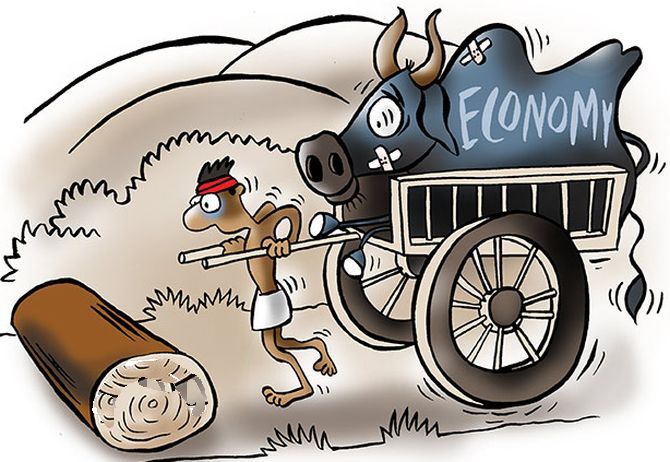The NCEAR has indicated some improvement in the fourth quarter of the current financial year.

Think tank National Council of Applied Economic Research (NCAER) on Friday pegged the economic growth for the current fiscal at 4.9 per cent, a tad down from 5 per cent estimated by the National Statistical Office (NSO).
However, for 2020-21, the NCEAR expects the Indian economy to improve its growth rate to 5.6 per cent.
Indian economy grew by 6.1 per cent in 2018-19.
"GDP growth is forecast to be 4.9 per cent in Q3: 2019-20, and 5.1 per cent in Q4: 2019-20.
“The annual growth rates for 2019-20 and 2020-21 are forecast to be 4.9 per cent and 5.6 per cent, respectively," an NCEAR statement said.
The NSO as well as the RBI has projected the GDP growth rate at 5 per cent for the current fiscal.
The NCEAR has indicated some improvement in the fourth quarter of the current financial year.
Elaborating further it said, "Due to better rainfall in the monsoon as well as the post-monsoon seasons and considerable improvement in the storage of water in major reservoirs of the country, the prospects for growth in the agricultural sector remain bright."
Both the Ministry of Agriculture's second advance estimates and NCAER's own estimates point to higher agricultural output in the current fiscal versus the previous year.
This should also lead to lowering of food inflation in the coming months, which has otherwise remained high due to the lower than expected output of a few commodities, particularly vegetables and pulses, it added.
The Index of Industrial Production declined by 0.4 per cent in the second quarter of 2019-20 and by 0.9 per cent in the third quarter of 2019-20 on a year-on-year (y-o-y) basis.
The IIP of capital goods and consumer durables goods declined in the both second and third quarters of the current fiscal.
Consumer non-durables also declined in December 2019. On the bright side, core IIP improved in December 2019, with buoyant growth in the key sectors of steel and cement, it said.
The Nikkei PMI improved through November and December 2019 and January 2020.
Talking about green shoots in the services sector, it said, "The GVA of the services sector grew at 6.8 per cent in Q1 and 6.9 per cent in Q2 this fiscal.
“Three lead indicators, viz., tourist arrivals, aviation passenger traffic, and services trade, were the bright spots in Q3: 2019-20."
It further said, "Cargo traffic across different transport modes continued to show negative growth in the third quarter of the current fiscal.
“After falling to 49.2 in October 2019, the Nikkei PMI Services Index showed a sharp and sustained rebound. This signals that the sector is in the process of bottoming out."
The 2020-21 Budget, it said, has not provided the expected strong fiscal stimulus to revive faltering growth.
The revenue projections are still overly optimistic though more realistic than the projections last year.
"Aligning the expenditure projections with these revenue projections, with limited allowance for slippage in the fiscal deficit and no significant steps for additional revenue mobilisation, the 2020-21 Budget has failed to provide the required fiscal stimulus," it added.